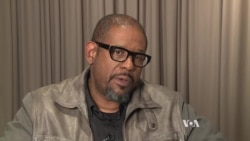Academy Award-winning actor Forest Whitaker uses his international fame to promote peace and reconciliation in areas of conflict in Africa and Latin America and disadvantaged areas of the United States. He also serves as a UNESCO envoy for Peace and Reconciliation.
Whitaker says that he has been struggling to understand the elemental causes of conflict since he was a kid in central Los Angeles. He recalled, “I think the first time I really tried to deal with it was when my cousin, who really was my roommate, went off to war, to Vietnam. And when he came back, he was a different person.”
Conflict was all around him. Growing up, he says he witnessed the rise of gangs in America. He says he could not attend certain schools because it was too dangerous.
But it was not until 2005, while filming the drama “The Last King of Scotland,” for which he won an Oscar portraying the Ugandan dictator Idi Amin, that Whitaker got to see a country ravaged by civil war. And he decided to take action to help victims of violence.
“I started to work with child soldiers in northern Uganda, and it was there that I realized the parallels of the stories and the parallels of the emotions, the kids I knew back home and the kids I met here and the people and their hearts," he said.
A new initiative
In 2012, he founded The Whitaker Peace and Development Initiative to foster growth and reconciliation in disadvantaged communities. Working with international organizations and experts, his organization promotes literacy in Northern Uganda, South Sudan and Mexico. Whitaker says the effort starts with education. Once people learn a vocation and other life skills, they are not as prone to violence because they are invested in something constructive.
People in communities of South Sudan are learning how to use computers through newly built technology centers. In other areas of the country, his organization is empowering young people to build bridges and roads that are crucial for getting water, food and natural resources.
Whitaker says people from different tribes - often combatants - learn to work together for the sake of their communities. “It is a chain reaction by training the trainers and then training the community….By the time this [bridge construction] project is done in Eastern Equatoria [South Sudan] at least 300,000 people will be affected, and there are about a million people in that state.”
In Tijuana, Mexico, the Whitaker Foundation for Peace and Development helps young people escape a life of drugs. Whitaker says the root of drug trafficking there stems from the psychology of poverty.
He says most of these kids who get involved in gangs and drug trafficking want to belong; that sense of belonging gives them power and purpose. In Mexico, he noted, drug trafficking is often viewed as a business because it is the only trade where young people from poverty-stricken areas can have financial advancement.
But, he said, it’s a false assumption; “If they were kings as a gang member or drug dealer, if they had the opportunity, they would probably be a king in economics or in a store or in the university.”
In northern Uganda, Whitaker’s organization teaches ex-child soldiers trauma relief methods to help them overcome memories that haunt them and prevent them from getting ahead in life.
The Oscar-winning actor says many of these youngsters - some as young as 7 - had been abducted by rebel armies, and forced to commit atrocities so they would sever any ties with their homes and their families. Because of the shame, they can’t go home now.
Experts from Whitaker’s foundation worked with a group of ex-soldiers two years ago, showing them how to calm their minds through meditation. Every morning since then, the boys - now attending school in Northern Uganda - practice meditation. Whitaker says it has made a difference. “One of the boys told me that before [he] could only figure out how to calm [his] mind with alcohol, because of the things that [he] dealt with.”
A busy schedule
Forest Whitaker visits Northern Uganda, South Sudan and Mexico every few months to oversee the projects. He says that many locals don’t know he is a movie star because there are very few movie theaters in the regions.
But local political leaders know who he is, and that allows him to wield influence. As a UNESCO envoy, he met with South Sudanese president Salva Kiir Mayardit in June to discuss ending and preventing the recruitment of children in the country’s armed forces. The president signed an agreement formally recommitting itself to that goal.
Whitaker says he will continue making movies, for a while. But he believes working for peace and development is his true calling. “Ultimately, this is what I’ll be doing. I think this is what I was supposed to do. It occupies most of my time but I am fortunate I get to meet some amazing people.”





